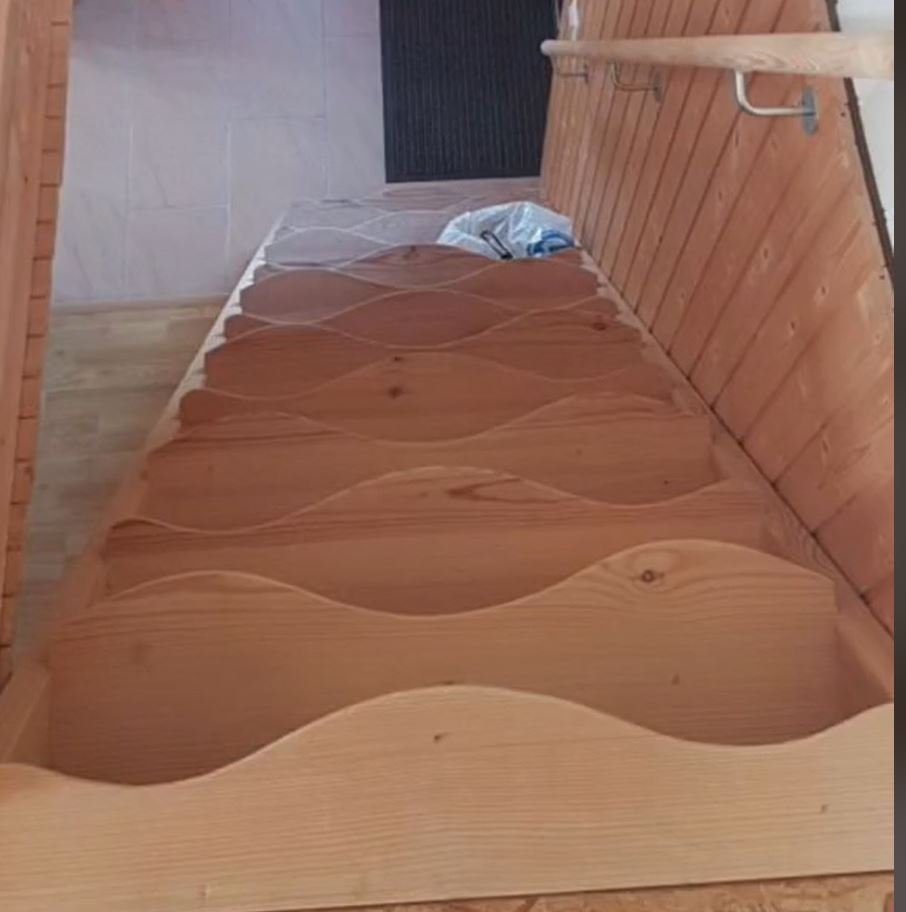Witches’ stairs are a strange but interesting design feature that became popular on TikTok a couple of years ago. Even though they have an unusual history, their name doesn’t really have to do with superstition. Instead, these stairs are a clever design choice. When made and installed correctly, they can be both useful and nice to look at!
Witches’ Stairs aren’t what they Appear.

While the stories about witches’ stairs might sound more interesting, they actually have a very practical purpose. They are really useful in homes with little space, like attics, lofts, and tiny houses. Witches’ stairs are designed to save space while still allowing you to go from one floor to another. Architects often call them “alternate tread stairs.”
How Witches’ Stairs Function

Photo Credit: itsthatrealestatechick | TikTok
Witches’ stairs are designed to save space in two ways. First, each step is only half as wide as regular steps, and the steps are staggered. This makes the staircase narrower than a traditional one. These smaller stairs can also be used for extra storage, like for books or displaying items. According to Scott Schuttner, who wrote “Basic Stairbuilding,” the distance between the steps on one side of an alternating-tread stair is twice the height of the rise, which gives you more space on the steps and makes them safer.
Besides being practical, witches’ stairs meet building codes and safety standards in the U.S. A standard staircase is usually 3 feet wide, while a residential witches’ staircase is typically between 27 and 30 inches wide.
Real Origins

Photo Credit: itsthatrealestatechick | TikTok
In 1985, a businessman named J.M. Lapeyre created a metal version of witches’ stairs. He thought these stairs could be a safe alternative to ladders in commercial and warehouse settings, especially in tight spaces where ladders might not be safe. This design is also used on commercial ships and oil rigs, and it can be called ship stairs or ship ladders, in addition to witches’ stairs and alternate tread stairs.
Misconception

Photo Credit: itsthatrealestatechick | TikTok
When videos of witches’ stairs first appeared on TikTok in 2021, they were linked to an urban legend. According to this legend, these staircases were built in 17th-century Massachusetts to keep witches away during the Salem witch trials because “witches can’t climb up them.” This idea has been proven false, but another rumor suggests that Thomas Jefferson came up with the design. Because of this, witches’ stairs are sometimes called Jeffersonian or Jefferson stairs. However, an original version of the design was also mentioned in a book called “Monckton’s One Plane Method Of Hand Railing and Stair Building,” published in 1888.
Debunking the Myth

Photo Credit: conspiracy___time | TikTok
The exact origins of witches’ stairs are a bit unclear, but one thing is clear: there’s no historical evidence that they were designed to keep witches away. Historian Robin Briggs has studied many historical sources and found no mention of stairs that could disable witches. Interestingly, some people with these unique staircases also buried “witch bottles” or included dead cats in their homes for protection against witchcraft, but Briggs calls this idea “pure disinformation.” He notes that the closest belief was that putting a broom over the door would trap a witch inside.
While it’s fun to think about myths and legends, it’s also interesting to know the real history of witches’ stairs. Regardless, they offer a unique and decorative alternative to regular staircases, adding a fun and quirky touch to home design.
Sofia Vergara is in shock

Barry Peele, a longtime friend and real estate agent who passed away at the age of 61, was honored by Olivia Culpo.
The Griselda actress created a charming Instagram slideshow featuring images of the couple taken over the years.
She captioned the photo, writing, “@barrypeele [heart]U, my life will never be the same without you.”
Barry’s cause of death is still unknown.
Supporters of 51-year-old Sofia have been expressing their condolences for the real estate agent in comments.
https://googleads.g.doubleclick.net/pagead/ads?client=ca-pub-3764810839868565&output=html&h=156&slotname=8851483697&adk=3627560602&adf=2027255178&pi=t.ma~as.8851483697&w=621&abgtt=6&fwrn=4&lmt=1727343759&rafmt=11&format=621×156&url=https%3A%2F%2Favokaddo.com%2F2024%2F09%2F18%2Fsofia-vergara-is-in-shock%2F%3Ffbclid%3DIwY2xjawFiC95leHRuA2FlbQIxMAABHb2t_Ntp5esv8JTf841UpqKIURZRDETC3ID9dXBGdKHEGYNYvyXuloWcxQ_aem_SFvs_Q1fAJpsPfndDuUH3Q&wgl=1&uach=WyJXaW5kb3dzIiwiNy4wLjAiLCJ4ODYiLCIiLCIxMjguMC42NjEzLjEzOCIsbnVsbCwwLG51bGwsIjY0IixbWyJDaHJvbWl1bSIsIjEyOC4wLjY2MTMuMTM4Il0sWyJOb3Q7QT1CcmFuZCIsIjI0LjAuMC4wIl0sWyJHb29nbGUgQ2hyb21lIiwiMTI4LjAuNjYxMy4xMzgiXV0sMF0.&dt=1727343759146&bpp=1&bdt=386&idt=264&shv=r20240924&mjsv=m202409190101&ptt=9&saldr=aa&abxe=1&cookie=ID%3Df135ce4e86665f75%3AT%3D1726307910%3ART%3D1727190100%3AS%3DALNI_MYZGtPAUaBbbO9tKipj8NXekf5QIw&gpic=UID%3D00000f017ebfb561%3AT%3D1726307910%3ART%3D1727190100%3AS%3DALNI_MacQ-mqfJy-GJ0qzahfFGg_f4JYqA&eo_id_str=ID%3D3f0950e9a66a245d%3AT%3D1726307910%3ART%3D1727190100%3AS%3DAA-AfjZva4kRQ7-qsVXp97wmqpVi&prev_fmts=0x0%2C621x280%2C621x156&nras=1&correlator=1264949893485&frm=20&pv=1&rplot=4&u_tz=420&u_his=1&u_h=768&u_w=1360&u_ah=728&u_aw=1360&u_cd=24&u_sd=1&dmc=8&adx=20&ady=1895&biw=661&bih=606&scr_x=0&scr_y=0&eid=44759876%2C44759927%2C44759842%2C31087375%2C44798934%2C95338243%2C95342015%2C95339679&oid=2&pvsid=862144232745753&tmod=275201898&uas=0&nvt=1&ref=https%3A%2F%2Fl.facebook.com%2F&fc=1920&brdim=-7%2C0%2C-7%2C0%2C1360%2C0%2C694%2C735%2C678%2C606&vis=1&rsz=%7C%7CoeEbr%7C&abl=CS&pfx=0&fu=128&bc=31&bz=1.02&td=1&tdf=0&psd=W251bGwsbnVsbCxudWxsLDFd&nt=1&ifi=4&uci=a!4&btvi=2&fsb=1&dtd=270

online after his passing.
https://googleads.g.doubleclick.net/pagead/ads?gdpr=0&client=ca-pub-3764810839868565&output=html&h=156&slotname=3197500636&adk=1333174584&adf=2438835175&pi=t.ma~as.3197500636&w=621&abgtt=6&fwrn=4&lmt=1727343810&rafmt=11&format=621×156&url=https%3A%2F%2Favokaddo.com%2F2024%2F09%2F18%2Fsofia-vergara-is-in-shock%2F%3Ffbclid%3DIwY2xjawFiC95leHRuA2FlbQIxMAABHb2t_Ntp5esv8JTf841UpqKIURZRDETC3ID9dXBGdKHEGYNYvyXuloWcxQ_aem_SFvs_Q1fAJpsPfndDuUH3Q&wgl=1&uach=WyJXaW5kb3dzIiwiNy4wLjAiLCJ4ODYiLCIiLCIxMjguMC42NjEzLjEzOCIsbnVsbCwwLG51bGwsIjY0IixbWyJDaHJvbWl1bSIsIjEyOC4wLjY2MTMuMTM4Il0sWyJOb3Q7QT1CcmFuZCIsIjI0LjAuMC4wIl0sWyJHb29nbGUgQ2hyb21lIiwiMTI4LjAuNjYxMy4xMzgiXV0sMF0.&dt=1727343759147&bpp=1&bdt=387&idt=319&shv=r20240924&mjsv=m202409190101&ptt=9&saldr=aa&abxe=1&cookie=ID%3Df135ce4e86665f75%3AT%3D1726307910%3ART%3D1727343760%3AS%3DALNI_MYZGtPAUaBbbO9tKipj8NXekf5QIw&gpic=UID%3D00000f017ebfb561%3AT%3D1726307910%3ART%3D1727343760%3AS%3DALNI_MacQ-mqfJy-GJ0qzahfFGg_f4JYqA&eo_id_str=ID%3D3f0950e9a66a245d%3AT%3D1726307910%3ART%3D1727343760%3AS%3DAA-AfjZva4kRQ7-qsVXp97wmqpVi&prev_fmts=0x0%2C621x280%2C621x156%2C621x156%2C661x606%2C621x280&nras=3&correlator=1264949893485&frm=20&pv=1&rplot=4&u_tz=420&u_his=2&u_h=768&u_w=1360&u_ah=728&u_aw=1360&u_cd=24&u_sd=1&dmc=8&adx=20&ady=2454&biw=661&bih=606&scr_x=0&scr_y=100&eid=44759876%2C44759927%2C44759842%2C31087375%2C44798934%2C95338243%2C95342015%2C95339679&oid=2&psts=AOrYGsmsVLrN3rX3W5FUEpRpjLxNpEww30juKsbEjW1KsLcbvPh94fUPpQHqmDLg_sARPxWRRA-JAp53O3mPLoyOtzHp7rw&pvsid=862144232745753&tmod=275201898&uas=3&nvt=1&ref=https%3A%2F%2Fl.facebook.com%2F&fc=1920&brdim=-7%2C0%2C-7%2C0%2C1360%2C0%2C694%2C735%2C678%2C606&vis=1&rsz=%7C%7CoeEbr%7C&abl=CS&pfx=0&fu=128&bc=31&bz=1.02&td=1&tdf=0&psd=W251bGwsbnVsbCxudWxsLDFd&nt=1&ifi=5&uci=a!5&btvi=4&fsb=1&dtd=50893
https://googleads.g.doubleclick.net/pagead/ads?gdpr=0&client=ca-pub-3764810839868565&output=html&h=156&slotname=2267562348&adk=527795001&adf=883214774&pi=t.ma~as.2267562348&w=621&abgtt=6&fwrn=4&lmt=1727343810&rafmt=11&format=621×156&url=https%3A%2F%2Favokaddo.com%2F2024%2F09%2F18%2Fsofia-vergara-is-in-shock%2F%3Ffbclid%3DIwY2xjawFiC95leHRuA2FlbQIxMAABHb2t_Ntp5esv8JTf841UpqKIURZRDETC3ID9dXBGdKHEGYNYvyXuloWcxQ_aem_SFvs_Q1fAJpsPfndDuUH3Q&wgl=1&uach=WyJXaW5kb3dzIiwiNy4wLjAiLCJ4ODYiLCIiLCIxMjguMC42NjEzLjEzOCIsbnVsbCwwLG51bGwsIjY0IixbWyJDaHJvbWl1bSIsIjEyOC4wLjY2MTMuMTM4Il0sWyJOb3Q7QT1CcmFuZCIsIjI0LjAuMC4wIl0sWyJHb29nbGUgQ2hyb21lIiwiMTI4LjAuNjYxMy4xMzgiXV0sMF0.&dt=1727343759148&bpp=1&bdt=388&idt=333&shv=r20240924&mjsv=m202409190101&ptt=9&saldr=aa&abxe=1&cookie=ID%3Df135ce4e86665f75%3AT%3D1726307910%3ART%3D1727343760%3AS%3DALNI_MYZGtPAUaBbbO9tKipj8NXekf5QIw&gpic=UID%3D00000f017ebfb561%3AT%3D1726307910%3ART%3D1727343760%3AS%3DALNI_MacQ-mqfJy-GJ0qzahfFGg_f4JYqA&eo_id_str=ID%3D3f0950e9a66a245d%3AT%3D1726307910%3ART%3D1727343760%3AS%3DAA-AfjZva4kRQ7-qsVXp97wmqpVi&prev_fmts=0x0%2C621x280%2C621x156%2C621x156%2C661x606%2C621x280%2C621x156&nras=3&correlator=1264949893485&frm=20&pv=1&rplot=4&u_tz=420&u_his=2&u_h=768&u_w=1360&u_ah=728&u_aw=1360&u_cd=24&u_sd=1&dmc=8&adx=20&ady=2634&biw=661&bih=606&scr_x=0&scr_y=300&eid=44759876%2C44759927%2C44759842%2C31087375%2C44798934%2C95338243%2C95342015%2C95339679&oid=2&psts=AOrYGsmsVLrN3rX3W5FUEpRpjLxNpEww30juKsbEjW1KsLcbvPh94fUPpQHqmDLg_sARPxWRRA-JAp53O3mPLoyOtzHp7rw&pvsid=862144232745753&tmod=275201898&uas=3&nvt=1&ref=https%3A%2F%2Fl.facebook.com%2F&fc=1920&brdim=-7%2C0%2C-7%2C0%2C1360%2C0%2C694%2C735%2C678%2C606&vis=1&rsz=%7C%7CoeEbr%7C&abl=CS&pfx=0&fu=128&bc=31&bz=1.02&td=1&tdf=0&psd=W251bGwsbnVsbCxudWxsLDFd&nt=1&ifi=6&uci=a!6&btvi=5&fsb=1&dtd=50927
Christian stated, “It makes me very sad to tell you that our dear friend and colleague Barry Peele has passed away suddenly.”

“Barry was a devoted and knowledgeable representative of the company for an extended period. He will be known as a wonderful individual who loved to spend time with his closest friends—many of whom were also his clients—and who lived life to the fullest.
“A lot of you have worked directly beside him. He will undoubtedly be missed. Gary, I hope you’re at peace.
Barry initially gained notoriety in the real estate industry, but he was also a producer.

He worked on the film Rize (2005), which took home the Golden Kinnaree Award for Best Documentary.
In addition, he contributed to the 2008 film I Am Because We Are.



Leave a Reply